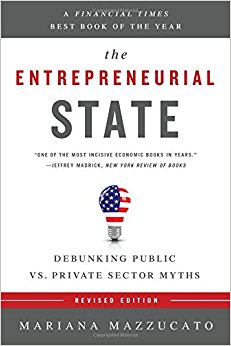| 商家名称 | 信用等级 | 购买信息 | 订购本书 |
 |
The Entrepreneurial State: Debunking Public vs. Private Sector Myths |  |
|
 |
The Entrepreneurial State: Debunking Public vs. Private Sector Myths |  |

“[Mazzucato] argues persuasively that a successful, innovative society must draw on symbiotic partnerships between governmental and private entities.” —Richard N. Cooper, Foreign Affairs
"Conventional economics offers abstract models; conventional wisdom insists that the answer lies with private entrepreneurship. In this brilliant book, Mariana Mazzucato…argues that the former is useless and the latter incomplete." —Martin Wolf, Financial Times
"Mazzucato argues that long-term, patient government funding is an absolute prerequisite for breakthrough innovation….Even if you disagree with Mazzucato's argument, you should read her book. It will challenge your thinking." —Bruce Upbin, Forbes
"It is one of the most incisive economic books in years." —Jeffery Madrick, New York Review of Books
"Ms. Mazzucato is right to argue that the state has played a central role in producing game-changing breakthroughs, and that its contribution to the success of technology-based businesses should not be underestimated." —The Economist
"[A] meticulously argued treatise that shows how unwise our conventional wisdom has become." —Christopher Dickey, Newsweek
网友对The Entrepreneurial State: Debunking Public vs. Private Sector Myths的评论
I'm writing this the day after the third Republican presidential debate. I doubt any of the candidates read The Entrepreneurial State, but they should have.
This book debunks plenty of myths, most notably that keeping government "out" of the economy is the best way to stimulate growth in three key ways.
First, it demonstrates the ways in which national governments have contributed to the success of today's iconic companies, including my beloved Apple.
Second, it shows that far from "picking winners" improperly as politicians claim, public/private partnerships provide leadership for key sectors of the economy, whether that be national security (where it has been most pronounced) to environmental security (where it is arguably most needed).
Third, it makes the case for an economy based on partnerships in which the state and the private sector share both the risks and the rewards for economic innovation.
I would have liked the book to go even farther and look at the role such partnerships could/should play in an interdependent networked economic system, but it does enough to warrant a read by just about anyone interested in social change, including a peacebuilder like me.
Well written and I learned quite a few things. Large corporations are getting free R & D from US government, and paying very little in the way of taxes. That means taxpayers are subsidizing them. In the 50's that was OK because US Corporations were in the 90% tax bracket. At the time I though a 90% tax bracket to be excessive. At the time I couldn't figure out how they were doing so well while they were paying so much in taxes. Now I know it was because tax payers were paying for the development of new products, and in some cases drugs. Since their tax bracket was so high, it seems fair that the government did so much for them, but now the highest tax bracket is 35% and most company pay only 16% at most..
The importance of the public sector as a key player in an innovative ecosystem is not often acknowledged nor well understood. In a brilliant book, the author has made the case for the public sector role persuasively. In a world that glorifies individual entrepreneurs and venture capitalists as the risk takers who drive the innovative economies, readers of this book will be led to realize that it is quite often the public sector investors who have been the true risk takers with respect to the innovations that have made the most impact on society. Another key insight provided is that when the rewards for innovation and risk taking are disproportionately allocated to those whose risks are relatively modest (i.e. venture capital) this creates an innovation system that increases inequality and is less sustainable than one which rewards risk takers (public and private) more fairly. Unless the public sector can reap rewards that recognize its role in the creation and regulation of new markets, the innovation system will be less likely to create major breakthroughs like the internet, nanotechnology, etc. The clear message of this book is that a true innovation system that is sustainable and that will create transformational change requires the full participation of the private sector and the public sector working together to do what each does best.
Mazzucato sheds light on the little talked about and often underestimated role that governments play in innovation. Her overall messages - that the state makes keystone contributions to the innovation process across industries and that the rewards of this innovation accrue largely to the private sector - add a new perspective on a number of public debates. It's an enriching read.
But do not expect a comprehensive treatise on the balance between public and private sector participation in innovation. Mazzucato focuses largely on how the state drives innovation. She is careful not to dismiss the importance of businesses, and in the case of Apple she concedes the company deserves credit for the innovative way it integrated various technologies in a well designed and marketed product. But what I missed in this book is a model of how innovation occurs that could help us understand more precisely the interplay between the actors and their relative contributions. This is not to say the book is unfair or imbalanced. I simply see it as the first volume in a new, more nuanced public discussion on innovation that Mazzucato aims to launch with her book.
Mazzucato is a clear writer and the book is exceptionally accessible, even though Mazzucato is an academic. What irked me though is that she is at times repetitive. Perhaps you couldn't blame her for trying to drive home her message given how underrepresented it is in public discourse.
喜欢The Entrepreneurial State: Debunking Public vs. Private Sector Myths请与您的朋友分享,由于版权原因,读书人网不提供图书下载服务